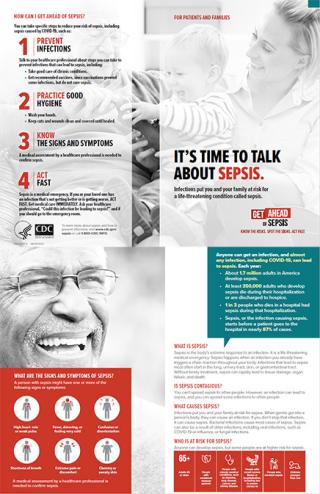CENTER FOR DISEASE CONTROL AND PREVENTION (CDC): ITS TIME TO TALK ABOUT SEPSIS

Centers for Disease Control and Prevention. CDC : Saving Lives, Protecting People twenty four seven.
https://www.cdc.gov/sepsis/index.html
Learn what sepsis is, if it is contagious, what causes sepsis, who is at risk, the signs and symptoms, and what you should do if you think you might have sepsis
What is sepsis?
Anyone can get an infection, and almost any infection, including COVID-19, can lead to sepsis.
In a typical year:
At least 1.7 million adults in America develop sepsis.
At least 350,000 adults who develop sepsis die during their hospitalization or are discharged to hospice.
1 in 3 people who dies in a hospital had sepsis during that hospitalization
Sepsis is the body’s extreme response to an infection. It is a life-threatening medical emergency. Sepsis happens when an infection you already have triggers a chain reaction throughout your body. Most cases of sepsis start before a patient goes to the hospital. Infections that lead to sepsis most often start in the lung, urinary tract, skin, or gastrointestinal tract. Without timely treatment, sepsis can rapidly lead to tissue damage, organ failure, and death
What are the signs & symptoms?
What should I do if I think I might have sepsis?
Fact Sheet, Brochure, and Conversation Starter.
Is sepsis contagious?
You can’t spread sepsis to other people. However, an infection can lead to sepsis, and you can spread some infections to other people.
Sepsis happens when…
Transcript: Sepsis happens when [TXT 1 1 KB]
What causes sepsis?
Infections can put you or your loved one at risk for sepsis. When germs get into a person’s body, they can cause an infection. If you don’t stop that infection, it can cause sepsis. Bacterial infections cause most cases of sepsis. Sepsis can also be a result of other infections, including viral infections, such as COVID-19 or influenza, or fungal infections. Most people who develop sepsis have at least one underlying medical condition, such as chronic lung disease or a weakened immune system. Nearly a quarter to a third of people with sepsis had a healthcare visit in the week before they were hospitalized.

